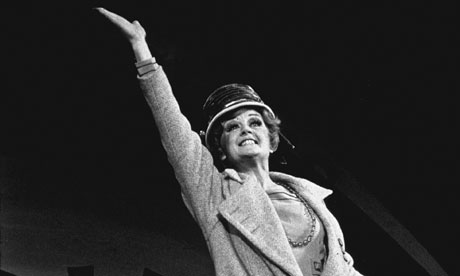The Book Man
Playwright Arthur Laurents has died. He was busy up until the end, planning a film remake of Gyspy starring Barbra Streisand. Laurents first gained notice on Broadway in 1945 with Home Of The Brave, a well-regarded drama about anti-Semitism in the army. In 1953 he had some success with The Time Of The Cuckoo, which was adapted into the memorable 1955 Katharine Hepburn film Summertime, directed by David Lean.
Though he made his mark as a dramatic playwright, he will be remembered for the books he wrote for musicals, particularly West Side Story in 1957 and Gypsy in 1959. A book writer has to get across a lot in very few words, and this seemed to be Laurents' specialty. (He's also responsible for inspiring the songwriters, who will often take ideas and phrases from the book and claim them for their own).
West Side Story, a modern-day version of Romeo And Juliet, has one of the shortest books of any musical, since so much time is spent on dance. And yet, at the end, the dramatic high point, when Maria discovers Tony, her lover, dead, the creators of the show--Leonard Bernstein, Stephen Sondheim and Jerome Robbins--relied on the book. They tried to create songs or dances that would express the moment, but the simple, eloquent words of Laurents worked best.
Laurents also had to create a street lingo for the young people in the play, since no one was ready for actual swearing onstage at the time. Whenever I hear Dennis Miller say "frabba-jabba," I think of Laurents. Laurents himself was not modest about his work. He claimed that West Side Story actually improved on the plot of Romeo And Juliet.
His greatest book may be Gypsy. Once again, he was working with Sondheim and Robbins, this time with Jule Styne composing. They had the memoirs of striptease artist Gyspy Rose Lee, but how to turn it into a musical? Originally Robbins saw it as a chance to salute all the old acts of Vaudeville and burlesque, but it was Laurents who realized the real story was about Gypsy's outrageous stage mom, Rose. Thus he created probably the greatest musical role a woman can play.
He and Sondheim devised the script while Robbins was away in London. Laurents asked Gypsy herself how she started stripping and she replied she'd made up so many stories, she wasn't sure any more. After she saw the play, she said she'd wished she'd used Laurents' version.
Laurents developed into a major stage director, and he solved a problem that Gypsy had always had. "Rose's Turn" is the big number near the end of the show. It's actually about a woman looking back at her life and losing her mind. Laurents and Sondheim wanted to be realistic and refused to have Ethel Merman, the original lead, take a bow at the end, as it would break the mood of the moment. Oscar Hammerstein, Sondheim's mentor, saw the show out of the town and told them even if it was artistically dishonest, they had to let the audience applaud, or they wouldn't be able to concentrate on the final scene with Rose and daughter Gypsy. When Laurents directed a revival starring Angela Lansbury, he had Rose bow at the end and get her applause. But she kept bowing, long after the applause died down, and it became apparent the applause was simply in her fevered imagination.
Laurents continued writing for Broadway, and continued working with Sondheim, creating the cult classic (i.e., failure) Anyone Can Whistle as well as adapting The Time Of The Cuckoo into the little-loved musical Do I Hear A Waltz?, lyrics by Sondheim, tunes by Richard Rodgers.
He'd worked in Hollywood before, and had bad memories. But in the 70s Laurents wrote two hits, The Way We Were (1973)--which he claimed was hacked up into near incomprehensibility--and The Turning Point (1977).
He had his greatest success as a stage director with the 1983 blockbuster musical La Cage Aux Folles, winning a Tony for his work. (He'd also won a Tony for his 1967 libretto Hallelujah Baby!--it was a weak year for musicals.)
He wrote a memoir in 2000, discussing his career, not to mention his many homosexual relastionships. But he was an ornery cuss. Sooner or later, it seemed, he'd have a falling out with every friend and collaborator. By the end, for example, he and Sondheim weren't speaking.
He also wrote an entertaining and instructive book in 2009, Mainly On Directing: Gyspsy, West Side Story And Other Musicals. It has lot of practical advice, plenty of anecdotes, and a fair number of attacks on others who don't measure up to his standards.
I don't think anyone wants to be known as the guy who wrote books to musicals. I'm sure Laurents felt he was a lot more than that. But if you do it as well as he did, there's no shame in being remembered that way.





2 Comments:
West Side Story is my favorite movie. I cry every time I watch it. It's too bad Laurent died, I was hoping he'd write a remake entitled "Tony Lives! He tried hard enough!
Yes Indeedee!
Post a Comment
<< Home